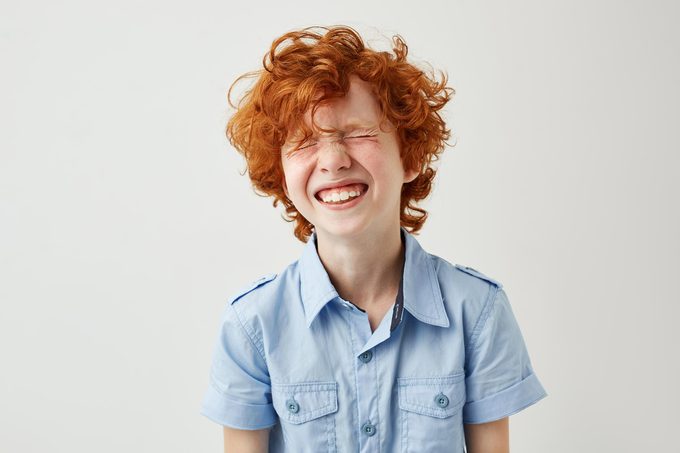Read This Before You Let Your Child Use Your Allergy Medication
Updated: May 07, 2020
When non-medical tricks like taking a shower and turning on the air conditioner don't help, turn to medications that are designed for little bodies.
Our editors and experts handpick every product we feature. We may earn a commission from your purchases.
Sneezing, nasal congestion, itchy, watery eyes, runny and itchy nose… if you have seasonal allergies, you’re all too familiar with these symptoms. As an adult, you surely have your treatment plan—whether it’s hiding indoors, weekly shots, stocking up on meds, or even sucking it up. But when you notice the same irritating symptoms in your children, you certainly don’t want to keep them cooped up inside, nor do you want them to suffer through it. So are medications the way to go?
There are a variety of ways parents and children can alleviate allergy symptoms—including medications and holistic remedies, but there is no cure for them. According to Reena Patel, MD, pediatric and adult allergist and immunologist based in New York City, it’s up to the family what route they take.
“Every patient is different and there is never one medication that will treat every patient. I like to understand the parent and patient’s beliefs to better understand what treatment option will suit their needs,” Patel says. “If a parent prefers natural remedies, we definitely can work with them in finding some great options.”
Start natural
There are various natural remedies to try. A child can take a shower immediately after coming in from outside to help remove any pollen on their hair or skin. They can splash water on their face to wash away pollen if they have itchy, watery eyes. They can try a saline sinus rinse to help clean out sinus passageways. The rinse uses simple ingredients such as water, baking soda, and non-iodized salt.
“If parents and children are not seeing results with the non-medicated approach, they can also consider a variety of non-prescription and prescription medication,” Dr. Patel says. “I like to start with non-sedating antihistamines, this way they are able to control their symptoms and not be drowsy during the school day.”
Antihistamines are available over the counter or as a prescription and, no surprise here, they work by decreasing the release of histamine, a natural chemical that’s part of the immune system. It preps the body to fight off intruders, but allergens encourage the body to release it unnecessarily, and it can lead to all kinds of trouble—from itching to hives to system-wide shock (anaphylaxis). For children 6 months old and up, Clarinex Oral Solution and Xyzal Oral Solution are prescription options. Over-the-counter choices for children 2 years old and up include Children’s Allegra Allergy Oral Suspension, Claritin Syrup, and Claritin Chewables. For kids 6 years old and up, Alavert Tablets, Zyrtec Liquid Gels, and Claritin RediTabs are over-the-counter options and Patanase nasal spray is a prescription alternative. For 12 years old and up, Allegra-D and Zyrtec-D are over-the-counter choices, and Astelin nasal spray is a prescription option. Some of the main side effects of antihistamines include dry mouth, drowsiness, dizziness, nausea, and vomiting.
There are also prescription anti-leukotrienes like Singulair and Zyflo: Leukotrienes are an immune system chemical that triggers allergy symptoms such as excess mucus; these drugs also help to treat asthma brought on by allergies. If your child suffers from asthma, this is an ideal medication to treat their allergies. Singulair Oral Granules and Singulair Chewable Tablets are among the best prescription options for children. Possible side effects include flu-like symptoms, feeling nervous or excitable, headache, stomachache, nausea or vomiting, and nasal congestion.

Clear the sinuses
Decongestants are another option—they work by shrinking the blood vessels in the nose to alleviate congestion. They’re available over-the-counter or as a prescription. Decongestants aren’t advised for kids under 4 years old and they shouldn’t be combined with antihistamines. Adult strengths should also be avoided in children. Sudafed Nasal Decongestant Liquid is one over-the-counter option.
Nasal corticosteroids are available by prescription. Over-the-counter nasal saline sprays like Ocean for Kids or Little Remedies for Noses Saline Spray/Drops are nonmedicated options. “A variety of nasal steroid sprays are now available over the counter, but we always discuss the risks of these medications in young children and the appropriate way in which to use them,” Dr. Patel says. “There are prescription nasal sprays that the doctor can also add on including antihistamine nasal sprays.” Nasonex and Veramyst are options. Side effects of such medications can include headache, stuffy nose, sore throat, cough, and more.
It’s important to always talk to your pediatrician or allergist before administering medications to determine the correct medication, as well as dosage.
